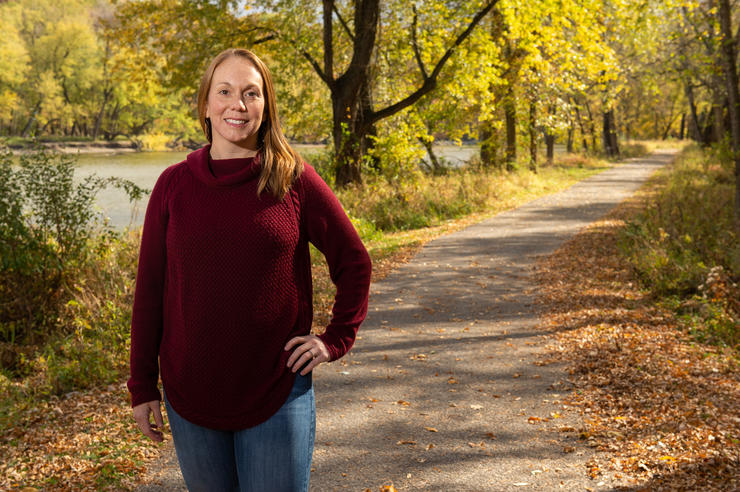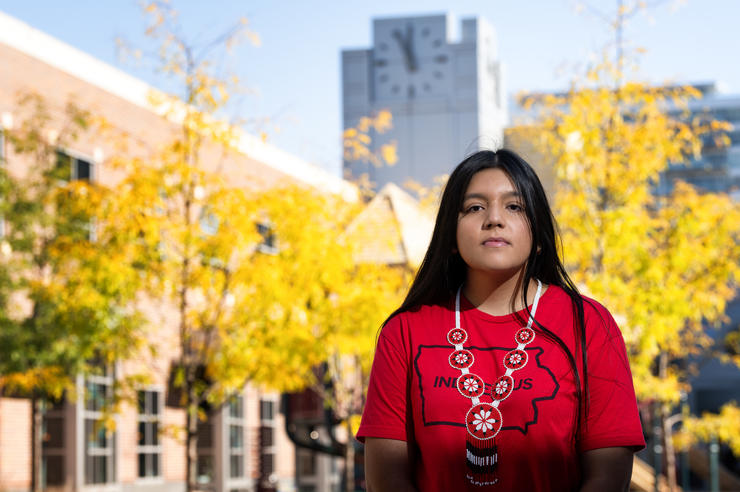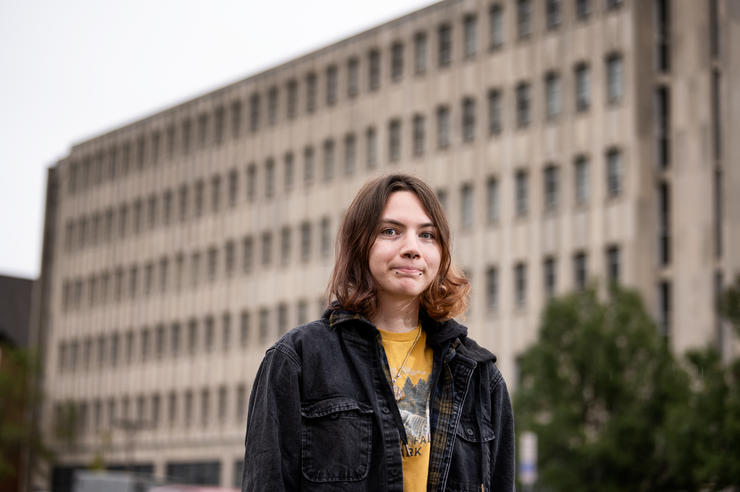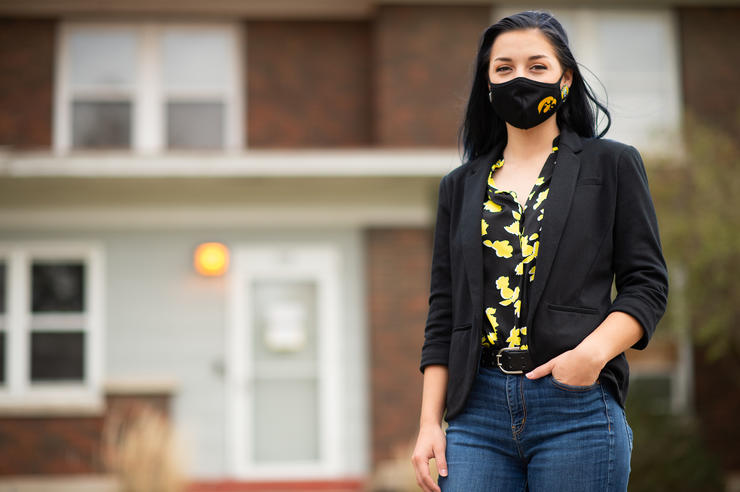Sharing passion of powwow dance, Native culture
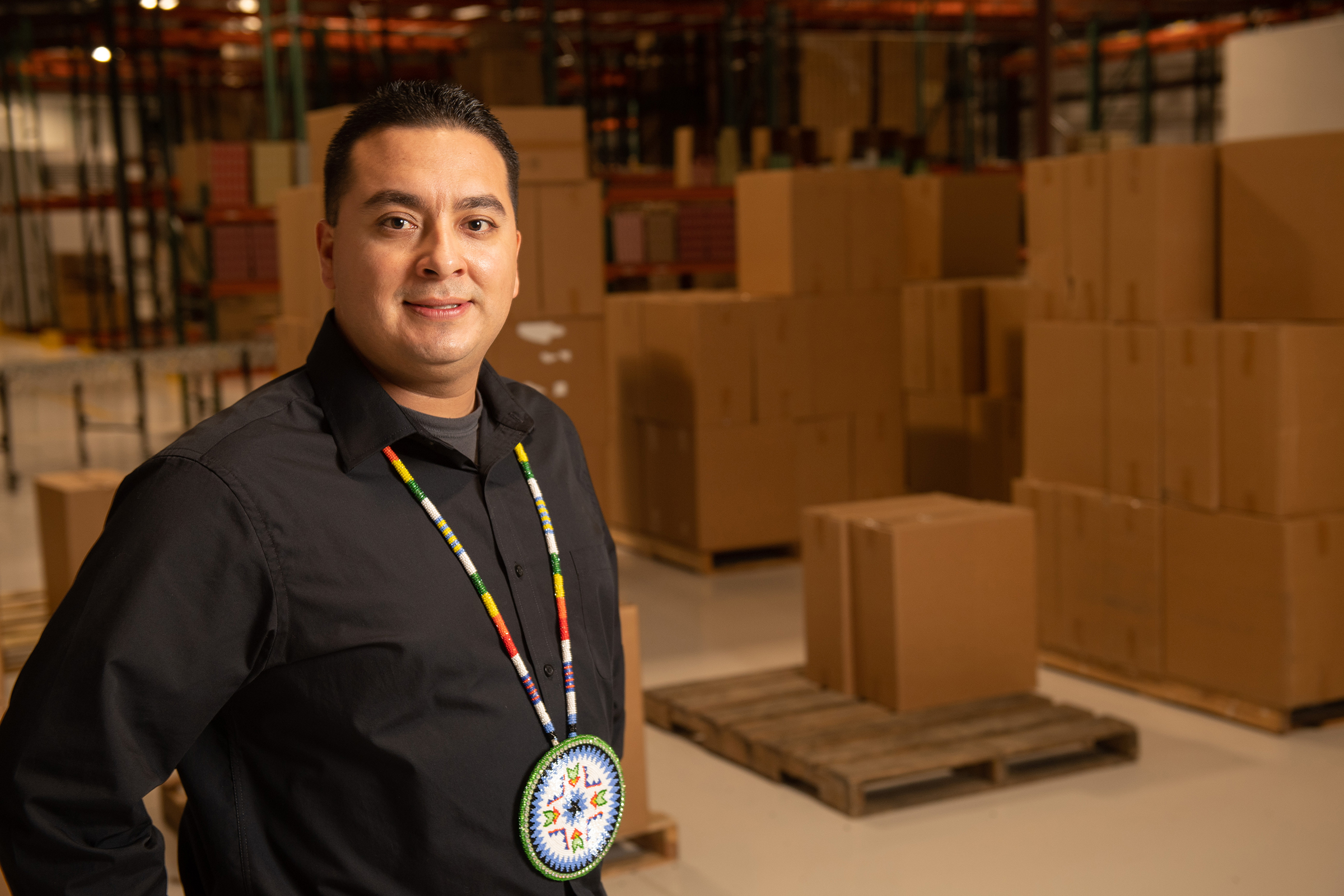
Darrell Hill has been participating in powwow dance competitions since he was in the tiny tot category. For 30 years, the member of the Oneida and Menominee Nations from Wisconsin has been dancing and singing with his drum group in powwows across the United States and Canada—sometimes traveling 36 weeks of the year.
“It becomes a way of life,” Hill says. “You see a lot of different people and meet a lot of different people. Through them I’ve learned core values of respect, kindness, love, sympathy, empathy. It’s also made me realize the potential ways I could give back to the Native youth.”
Hill is currently working toward his goal of helping Native American youth at the University of Iowa by getting an MA in teaching, leadership, and cultural competency through the College of Education.
The MA in Teaching, Leadership, and Cultural Competency (MATLCC) is designed to fit the needs of busy professionals. Offered entirely online, the flexibility and convenience of this program allows working educators to earn their advanced degree in as little as 20 months.
The MATLCC program is designed to build the requisite skillset necessary for educators who want to lead curriculum and instructional development strategies in education and become effective teacher leaders.
After earning an associate’s degree in business management in Milwaukee where he grew up, Hill worked in contract negotiation and logistics for small businesses. He also helped facilitate cultural exchanges, bringing dance performances and presentations to universities and businesses throughout the U.S. and Canada. It was through this work that Hill met his wife, Grace Hill, who is from Tama, Iowa, and a member of Meskwaki Nation. Along with doing similar work, the two also shared an interest in competing in dance and song.
The couple moved with their three children to Tama in 2013 and Hill began working for the Meskwaki Nation.
“After working and getting situated in the community, I decided it was time to further my education and do what I had to do to be successful,” Hill says.
He began work on a BA in communication studies at Iowa in 2016 and graduated in December 2019.
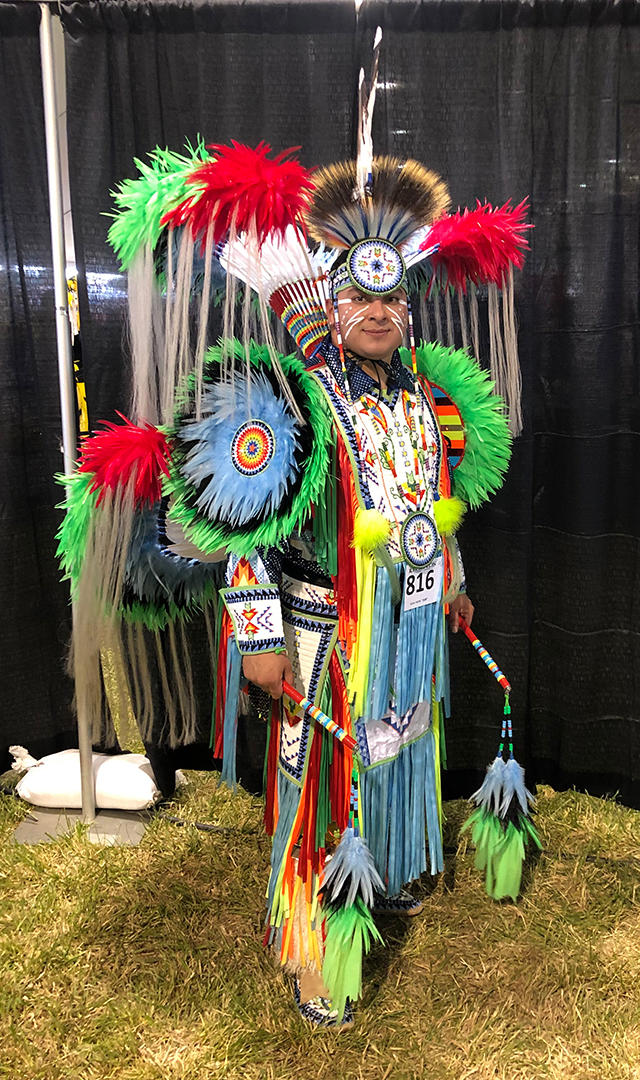
“I already had a business degree and wanted to extend those studies, but the schedules didn’t match up,” Hill says. “I talked to people in administration, and communications ended up being the best fit for me and what I excelled in. I was very impressed with Iowa’s program and curriculum and how well-versed it was regarding the media, the discourse, the theories, and technology. It was a well-rounded place for me.”
After his first semester, Hill encouraged his wife to enroll as well. She graduated with a bachelor’s degree in health and human physiology—health promotion in May 2020.
Soon after Hill started at Iowa, Tracy Peterson, his adviser and former diversity and outreach programs director for the Iowa College of Engineering, connected him with Iowa’s Latino Native American Cultural Center (LNACC) and Native American Student Association (NASA).
Hill has put all of the knowledge and connections he has built over the years on the powwow competition circuit—plus a history in business—to good use the past five years as chair of the University of Iowa Powwow.
“They knew about my powwow experience, how many years I’ve worked in that type of area, and just threw me in the mix,” Hill says. “When I came in 2016, it was a very local event with local dancers and singers. There are people who travel and make a living participating in these powwows. We’ve coordinated with our colleagues at Wisconsin and Michigan so we don’t conflict with their dates and give people the opportunity to come to Iowa. Before COVID-19 canceled the 2020 powwow, we were really becoming competitive.”
Hill appreciates the guidance and support from LNACC and university administration for NASA’s main annual event.
“(Native American Heritage Month) gives us a chance to try to bridge the gap of knowledge of cultural competency between Natives and non-Natives. Iowa is not a big minority school. Native Americans don’t even constitute 1% of the campus population, so it’s important to be able to bridge that gap of knowledge and let people know we’re here, we’re on campus, we’re amongst you.”
“It’s a great event to take part in and witness, to see all the different people, dances, songs, colors,” Hill says. “It’s a beautiful thing to witness, but there is all kinds of work going on behind the scenes to make sure these things are successful.”
While the fate of the 2021 powwow is up in the air, Hill is still looking forward to November’s Native American Heritage Month.
“It’s our time as a student organization to shine,” Hill says. “It gives us a chance to try to bridge the gap of knowledge of cultural competency between Natives and non-Natives. Iowa is not a big minority school. Native Americans don’t even constitute 1% of the campus population, so it’s important to be able to bridge that gap of knowledge and let people know we’re here, we’re on campus, we’re amongst you. We don’t live in teepees; we don’t ride horses. We drive cars and dress normal. I like Starbucks just as much as you do.”
Hill says it’s also important to reach out to professors and administrators as well.
The University of Iowa Powwow was founded in 1990 as a way to celebrate and share Native American culture and tradition with the Iowa community. Over the years, it has welcomed thousands of people and featured drum groups, dancers, and arts and crafts and food vendors.
“What can they do a little more of to retain people of color or the Native American population?” Hill says. “How can they seek out and better understand some of the problems, issues, and barriers we face on a daily basis, not only in the school system but in our neighborhoods, communities, and families in general?”
One of Hill’s goals after he earns an MA is to incorporate financial literacy into the curriculum for Native students.
“Our high school students often don’t know about business or the real world,” Hill says. “What I’m trying to do is come up with a curriculum aspect, standards, and assessments about how we would be able to implement in a classroom of study how to fill out a rental application, how to set up a bank account, how to seek out your credit score, how to fill out a job application and do a job interview. Not only that, but trying to get them ready to fill out a FAFSA form and college application. A lot of them are done after high school because the process is so challenging. I come from a real rugged city background, to be honest, and I want them to see and understand it’s possible.”
Hill says he has appreciated and been inspired by the help he has received through his educational journey at Iowa.
“The university has some great people who are paving the way for students like me,” Hill says. “The financial aspect, the world aspect—there are a lot of external factors against us and against me right now. But from what I experienced, there are a lot of great and cool people who empathize with this type of situation and are trying to work to keep us and help us with financial sustainability. I’ve been fortunate to be in touch with a couple associate deans, such as Shelly Campo, Ken Brown, and Tracy Peterson. For me to be able to have people like that to work with or work with you, that’s become a passion for myself as time goes on.”
Hill also cites TRIO Student Support Services and LNACC for playing a role in his transition back to school.
“The LNACC and the other houses of help and resources have a huge impact on students of color and students of minority,” Hill says. “It’s a big campus and you have to find where to fit in and how to fit in. I’m thankful for that area to be in touch with ourselves and find comfort away from home.
“I’ve grown to love Iowa and be proud of being a Hawkeye,” Hill says. “Opportunities presented themselves on campus during the time of normalcy, and support and connections are still available during the pandemic—just in a different way.”
Hill doesn’t miss the 75-minute drive to campus, but he is disappointed that COVID-19 has caused events such as the 2020 powwow to be canceled and disrupted or changed how events for Native American Heritage Month will be held.
In the meantime, Hill and his wife are raising the next generation of dancers. Their children—ages 15, 10, and 8—have been dancing since they could walk, and during normal times join their parents in competing at powwows across the country.
“They do really well,” Hill says. “They had good teachers!
